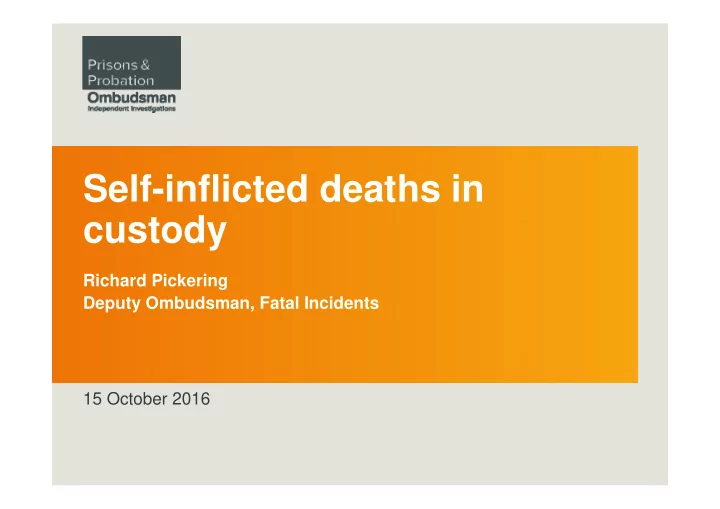

Self-inflicted deaths in custody Richard Pickering Deputy Ombudsman, Fatal Incidents 15 October 2016
What we do • The PPO carries out independent investigations into deaths and complaints in custody in England and Wales • Two main duties – To investigate deaths of prisoners, young people, approved premises’ residents and immigration detainees – To investigate complaints 2
Deaths we investigate & why • The PPO investigates deaths due to any cause – Natural causes, homicide and self inflicted • The purpose is – To understand what happened – To correct injustices – To identify learning for the organisations we oversee • So that we can make a significant contribution to safer, fairer custody and offender supervision 3
The facts and figures • The PPO started investigations into 103 self inflicted deaths in 2015-16 • 85 male prisoners • 9 female prisoners • 5 young offenders (under 21) • 3 approved premises residents • 1 IRC resident • The highest number in a single year • Shocking 34% increase from 2014-15 4
Tackling the shocking increase • Never been a more important time to learn lessons about preventing suicide • Yet we are not clear why there has been such a shocking increase: – Staffing issues, crowding and regime restrictions all play a part – So must troubling levels of mental ill health – And epidemic of new psychoactive substances – But no simple, single explanation suffices • In such a complex context, effective thoughtful efforts at prevention by staff are vital 5
Troubling mental ill health levels •Review of the identification of mental health needs and the provision of mental health care for prisoners, based on the learning from our fatal incident investigations •70% of those who died from self- inflicted means had been identified with mental health needs •17% had been identified with a severe and enduring mental illness •42% had been identified with two or more mental health issues 6
Findings - Early identification • Early identification of mental health issues when prisoners arrive can be vital to ensuring appropriate care and support is put in place • The documentation that a prisoner arrives with may include important information about their mental health needs • At the initial health screen this is often an over-reliance on the prisoners demeanour and presentation - documented risk factors should always be considered • Information needs to be shared between community GPs and prisons, and from prison to prison 7
Findings – MH Awareness • Difficult or challenging behaviour might sometimes be the only way that distressed people with mental health problems are able to communicate when they need help • This can easily be misinterpreted, and can lead to punishment, when what is required is care and treatment • Prison and healthcare staff need to be aware of the warning signs of mental distress • But staff often do not receive any training in mental health awareness 8
Findings - Treatment • When mental health needs are identified, referral should be made to the appropriate healthcare professional • In 29% of self-inflicted deaths in the sample, a mental health referral was not made when it should have been • When referrals are made, they often take too long or don’t happen at all • 19% of prisoners in the sample who had been diagnosed with a mental health problem had received no mental health care from a health professional while in prison • 62% were prescribed drug treatments, but more than 1 in 4 were not fully compliant at taking their medication 9
Findings - ACCT • 27% of those who died from self-inflicted means were being monitored under ACCT at the time of their death • More than 4 in 5 of these prisoners had identified mental health problems • Active participation in ACCT procedures by prison and healthcare staff is often an integral part of a prisoner’s mental health care • Prison and healthcare staff should work together to develop care maps and to conduct reviews • Too often there is not a multi-disciplinary approach and the opinions of healthcare staff are overlooked 10
Lessons to be learned • Reception staff should review all the documentation that a prisoner arrives with, and pass on all relevant information as appropriate • The health professional responsible for the reception health screen should give due consideration to all of the information they receive about a prisoner when making an assessment, including SystmOne records • Mental health awareness training should be mandatory for all prison officers and prison healthcare staff, to provide them with necessary guidance for the identification of signs of mental illness and vulnerability 11
More lessons to be learned • All prisoners should have access to the same care they would expect to receive in the community, including psychological and talking therapies • Compliance with medication should be monitored and encouraged as part of an up-to-date care plan for prisoners with mental health problems • The mental health team should attend or contribute to all ACCT reviews for prisoners under their care, and should be fully involved in any important decisions about location, observations, and risk 12
The Future • What is clear is that more can and should be done to improve suicide prevention in prison – Clear, objective and practical recommendations – Sustained action on thematic learning – Effective thoughtful efforts at prevention by staff – Underpinning of safety and fairness 13
Recommend
More recommend